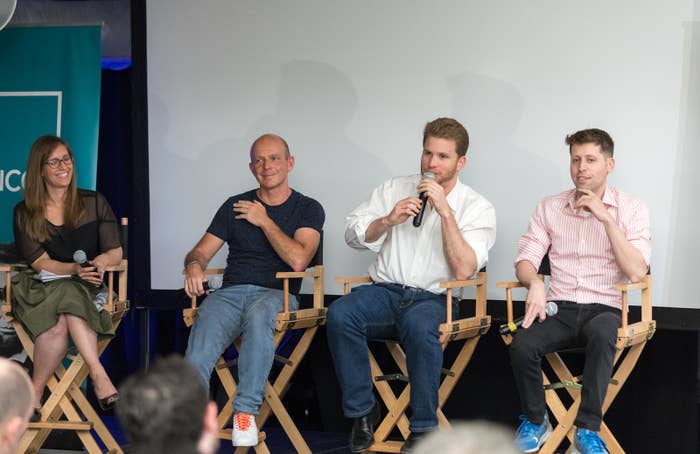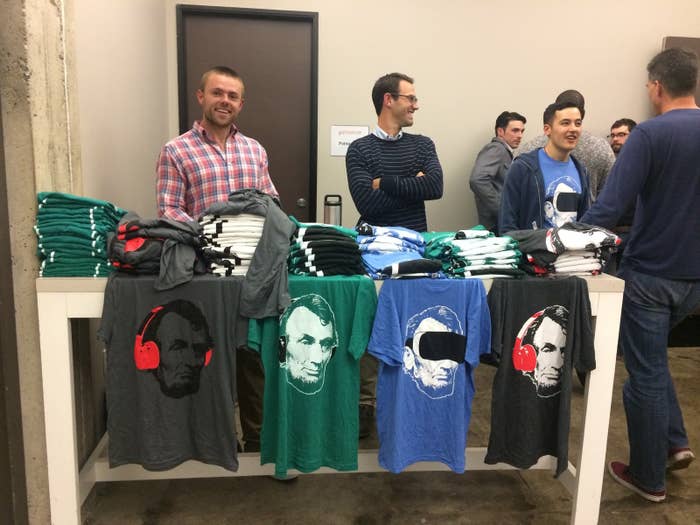
On Monday night, in the basement of a posh coworking space in downtown San Francisco, about 200 people gathered to hear the umpteenth panel discussion about how Silicon Valley should deal with Donald Trump. This event, however, had something most industry gatherings don't: a conservative bent.
Speakers included libertarian Joe Lonsdale, a Palantir cofounder turned high-profile venture capitalist; Steve Hilton, the CEO of the political startup Crowdpac, who has an upcoming show about populism on Fox; and Sam Altman, who runs Y Combinator’s parent company. The event was hosted by Lincoln Network, a right-of-center San Francisco-based political group whose motto is “where liberty and technology meet,” and whose logo used to be a drawing of Abraham Lincoln wearing a pair of Google Glass. (With Glass on life support, now the logo is a drawing of Lincoln sporting noise-cancelling headphones favored by engineers or an Oculus Rift.) Panelists defended billionaire Elon Musk’s decision to join Trump’s business advisory council against the backlash that played out on social media. “This is one of the least healthy things that has happened to our country, really, in the last five or 10 years — is this kind of online mobs of social justice warriors trying to take [you] down if you misspeak,” said Lonsdale.
“— There’s your quote for tomorrow,” said Altman, calling back to a prediction that Lonsdale made earlier in the evening: If you “screw up” talking about Trump, your quote shows up in the newspaper. The crowd — which included political consultants who advise tech people, tech people who advise politicians, a representative from the Cato Institute, various associates of billionaire Peter Thiel, and the occasional beer bottle rolling past the folding chairs on the concrete floor — cracked up.
“I can’t help myself, that’s why I shouldn’t do this in public,” Lonsdale said, explaining that groups who use social media to “demonize their foes” helped trigger the rise of Trump. “Ironically,” Lonsdale argued, “the same people who are saying, ‘You’re not allowed to work with [Trump] at all, we’re going to attack you, even if you think you’re trying to help the country,’ they have a responsibility for causing this in the first place.”

Lonsdale’s media prediction came at the start of the panel, when he claimed that he wasn’t expecting to discuss Trump. “Actually, Sam [Altman] and I were going to do a debate earlier on the future of jobs, and I just had my first kid a few weeks ago and I found out today we’re talking about Trump instead, which is terrifying because it’s slightly less easy to talk about in public. But anyways, this is better because now I can give a quote and be on the front page the next day if we screw up!”
Lonsdale’s comments were hardly a screw-up, certainly not with this crowd. Since before the election, prominent members of Silicon Valley’s priesthood have argued for more tolerance and acceptance towards Trump’s supporters (now his collaborators). This argument has persisted even as Trump’s actions in the first 100 days have actively undermined sacrosanct Silicon Valley causes like fighting climate change (Musk’s corporate raison d'etre) and promoting immigration of highly skilled workers.
On the panel, Altman — an independent who dines out on his anti-Trump stance — also insisted that cooperation with Trump was necessary. But the panelists’ hyper-awareness to the media doesn’t always stretch to self-awareness about Silicon Valley’s role in creating polarized public discussion. “I think absolutism is bad in any form and it has gotten us into this current mess we’re in," said Altman. "The internet has amplified the two-party political system so much and pushed us to the extremes of both parties that they’re both kind of imploding on themselves."
“People can engage in different ways. Some people will run the resistance, some people will run for office, some people will join [Trump’s] advisory board, whatever that is, but I don’t think it’s an acceptable option to say I’m going to completely disengage and do nothing,” Altman argued, building up the image of a plug-your-ears progressive that doesn't accurately describe his critics.
Hilton, who was David Cameron’s BFF until Hilton started backing Brexit, is better known as the husband of Rachel Whetstone, Uber’s very recently departed head of policy and communications, and he had his own caveat about the media.
Through his relationship with Whetstone, “I did see the dynamics of that unfold, for perspective, that’s all I’m saying, so I don’t want a headline about that,” Hilton said.
“Can we get the inside story?” Altman, butted in, asking the question on everyone’s mind.
Perhaps part of their willingness to cooperate stems from the fact that Trump’s policies are pro-business. “If we don’t figure out a way to unrig the system, which is currently in favor of a small number of deeply entrenched interests, then we’re going to continue to have a lack of economic justice and deeply frustrated people and candidates like this,” Altman argued. (In this case, he was talking about San Francisco real estate developers and not Silicon Valley giants like Facebook and Google, which have recently been under antitrust attack.)
Lonsdale’s latest effort, 8 VC, is a group of financiers and entrepreneurs who raised more than $300 million to make a positive impact on the world. He told the crowd he was most bothered by Trump’s immigration policy, which went against Silicon Valley’s culture. “I thought it was a mess and I thought it was bad branding for our country.”
But even there, Lonsdale saw a silver lining in increasing salaries for highly skilled tech workers and his own personal communication with the administration about top computer scientists who are unable to get visas to attend a computer science competition. “I sent an email to my friends at the White House at the request of a couple of CEOs a few days away — 'This is ridiculous. This is obviously bad for our country not to allow the people who are being invited here, the top computer scientists, to compete. We should get them visas.' And my friends there agreed and said they’d work on it. So I guess that’s a positive thing, I’d say, is there are a lot of practical good people who seem to be winning out in terms of how the White House works."
